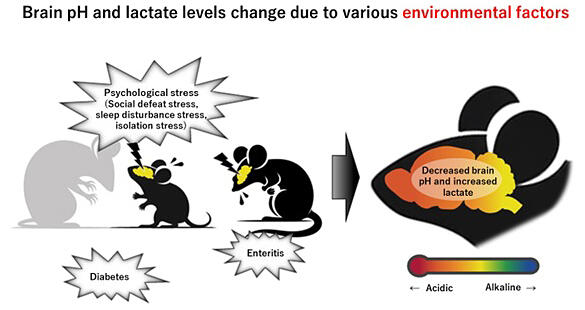In an international collaborative study by researchers from 105 laboratories in seven countries, a research group led by Professor Tsuyoshi Miyakawa and Assistant Professor Hideo Hagiwara of Fujita Health University analyzed the metabolism of the brain in 109 animal models, including disease models such as intellectual disability, autism, schizophrenia, bipolar disorder, depression, and Alzheimer's disease. They found that altered brain pH and lactate levels were common in many disease model animals and were particularly closely associated with cognitive impairment. This finding is expected to improve our understanding of common brain mechanisms for cognitive impairment in different diseases. This work was published in the online edition of eLife.

Provided by Fujita Health University
Studies have suggested that patients with neuropsychiatric disorders such as schizophrenia and bipolar disorder have abnormalities in the production of energy from the breakdown of glucose. Brain pH is considered to decrease due to an increase in lactic acid, an acidic metabolite from glucose. However, there was some debate as to whether these changes are phenomena related to the pathophysiology due directly to the disease or phenomena resulting from secondary factors (confounding factors) such as antipsychotic medications.
Miyakawa and his colleagues have previously found that decreased brain pH and increased lactate levels are commonly observed in five mouse models of schizophrenia/developmental disorder, bipolar disorder, and autism and proposed that these changes are phenomena related to the pathophysiology of the diseases. However, it remained unclear whether these brain changes are generalizable phenomena and whether they are associated with behavioral abnormalities.
In a collaborative study by a total of 131 researchers from seven countries, the research group collected whole brain samples from 109 different animal models, totaling 2,294 mice, rats, and chicks, with experimental manipulations such as genetic modification and stress loading, and measured pH and lactate levels. This comprehensive analysis revealed that altered brain pH and lactate levels were common features in various animal models of diseases, including models of depression, epilepsy, and Alzheimer's disease, in addition to models of schizophrenia/developmental disorders, bipolar disorder, and autism. Specifically, brain pH and lactate levels were significantly altered in approximately 30% of 109 model animals. In most of these, pH decreased and lactate level increased. This finding suggests that abnormalities in brain energy metabolism are shared by many animal models of disease. Moreover, the decreased brain pH and increased lactate levels were also observed in depression models in which healthy animals (mice and chicks) were subjected to psychological stress and mouse models of induced diabetes and enteritis with an increased risk of concomitantly developing depression.
This result indicates that various acquired environmental factors may be responsible. Furthermore, the decreased brain pH and increased lactate levels were also observed in mouse models of schizophrenia/developmental disorders other than those previously analyzed by the research group. Of the 109 model animals, 65 for which data were obtained initially were used as an exploratory cohort, and lactate data and behavioral test data were analyzed in an integrated manner. The results suggest that changes in brain lactate levels are associated with functional performance at the behavioral level. In particular, poor working memory performance was found to be associated with increased lactate levels.
An independent study using the remaining 44 model animals as a confirmatory cohort reconfirmed the association between increased brain lactate levels and reduced working memory. In mice models of autism, several models were found to show increased pH and decreased lactate levels, whereas other models showed decreased pH and increased lactate levels. This may correspond to patient subgroups (individual differences) in autism, of which symptoms vary greatly from individual to individual. The findings of this study may provide a new clue to understanding brain characteristics common to various diseases with cognitive impairment and may have an impact beyond the existing framework of disease classification.
Journal Information
Publication: eLife
Title: Large-scale animal model study uncovers altered brain pH and lactate levels as a transdiagnostic endophenotype of neuropsychiatric disorders involving cognitive impairment
DOI: 10.7554/eLife.89376.3
This article has been translated by JST with permission from The Science News Ltd. (https://sci-news.co.jp/). Unauthorized reproduction of the article and photographs is prohibited.




